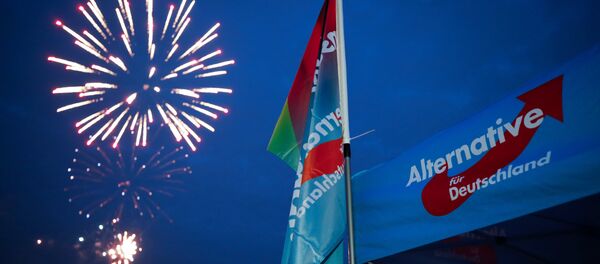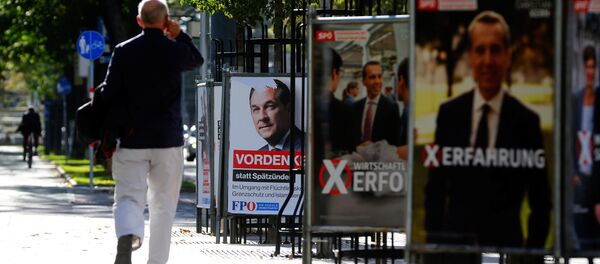PARIS (Sputnik) – Following the country's September election, the Alternative for Germany (AfD) party entered the 709-seat German Parliament for the first time in its history with 94 seats, becoming the third largest party to be represented in the legislature. Meanwhile, far-right Freedom Party of Austria (FPO) gained 26.04 percent of the vote at Sunday's legislative election, coming in third place and with the potential of joining the coalition with the Austrian People's Party (OVP), which won the election with 31.5 percent.
EUROPEAN INTEGRATION IN DANGER
"The far-right parties are something more than those Euroskeptic, they are Europhobic. In general, they base their campaign on the idea that all social problems can be resolved only in the framework of one state… They do not trust any political organizations apart from those run by the government. So, of course, they are anti-European," Lequesne said.
The expert noted that despite growing presence of the right-wing parties in the EU political life, such political forces failed to receive enough support to gain power. This was the case in France, where leader of the National Front party Marine Le Pan failed to win presidential run-off, and in the Netherlands, where the anti-EU Freedom Party did not manage to form a coalition.
Jean Chiche, a researcher with the Center for Political Studies at the French Science Po university, also agreed that the recently increased support for the right-wing movements endangered the European project. The expert referred to the idea of the so-called multi-speed Europe, or Europe of variable geometry, which outlines integration between the countries at different levels and pace depending on the political situation in each individual country.
"It will reshape the borders of Eastern Europe… Europe will become the thing it has been before. It is a 'multi-speed Europe' we are talking about, we will come back to the initial project of the European Union. If it is no longer possible to have Europe of 27 countries, we will have ‘Europe of variable geometry," the expert suggested.
Chiche pointed to some eastern European states, namely Hungary, Poland and Slovakia, with reactionary far-right forces in power, which have benefited from being members of the European Union over the past years due to open market and subsidies. However, these countries refuse to share EU principles of democracy, in particular they do not accept migrants coming to Europe, Chiche added.
"They profit from Europe, they put extremist government in power to fight against migration and they denounce the principles of classic democracy. This creates the new borders, cutting Europe," the expert suggested.
As for central Europe, the populist movements there cannot be considered extreme-right in a classic meaning of the term, Chiche said.
"[These movements] are the losers of globalization, the popular class representatives who do not benefit from a good salary, who are jobless, who have real difficulties in life, and who do not have any reason to participate in their state’s democracy or vote for the parties that neglect them, obviously. So we can see nothing but strong protest movement. This strong social uprising leads to populist movements, like in Italy and France," Chiche explained.
SUPPORT FOR RIGHT-WING IDEAS IN AUSTRIA
The fact the Austrian People's Party, led by 31-year-old Foreign Affairs Minister Sebastian Kurz, won the election signals the need to renew political elites, Lequesne pointed out.
"[Kurz] built his campaign on the ideas very close to those of the far-right, notably the [abandoning] protection of migrants, the fact that there are too many refugees who arrived since 2015 to Austria," Lequesne said.
"This is a lesson that we can draw from a good result, that the extreme-right forces showed [in the election], meaning that, after all, they do not recruit [supporters] only basing on the idea of an economic crisis. They recruit due to the identity issues," Lequesne suggested.
It is still difficult to say, whether the OVP will form a coalition with the FPO, the expert noted. If this right-wing party succeeds, it will require to appoint its representatives as ministers, including to the post of the interior minister, as this area covers the party's interests regarding migration control, Lequesne pointed out.



